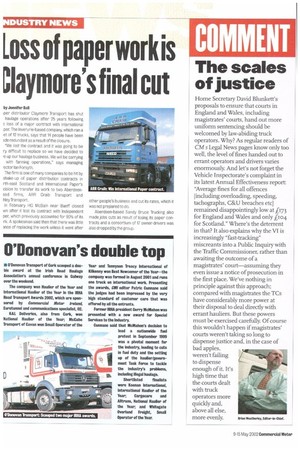The scales of justice
Page 8

If you've noticed an error in this article please click here to report it so we can fix it.
Home Secretary David Blunkett's proposals to ensure that courts in England and Wales, including magistrates' courts, hand out more uniform sentencing should be welcomed by law-abiding truck operators. Why? As regular readers of CM s Legal News pages know only too well, the level of fines handed out to errant operators and drivers varies enormously. And let's not forget the Vehicle Inspectorate's complaint in its latest Annual Effectiveness report: "Average fines for all offences [including overloading, speeding, tachographs, C&U breaches etc] remained disappointingly low at £173 for England and Wales and only £104 for Scotland." Where's the deterrent in that? It also explains why the VI is increasingly "fast-tracking" miscreants into a Public Inquiry with the Traffic Commissioner, rather than awaiting the outcome of a
magistrates' court—assuming they even issue a notice of prosecution in the first place. We've nothing in principle against this approach; compared with magistrates the TCs have considerably more power at their disposal to deal directly with errant hauliers. But these powers must be exercised carefully. Of course this wouldn't happen if magistrates' courts weren't taking so long to dispense justice and, in the case of bad apples, weren't failing to dispense enough of it. It's high time that the courts dealt with truck operators more quiddy and, above all else,
more evenly. Brian Weatherly, Editor-in-Chief.












































































































































































